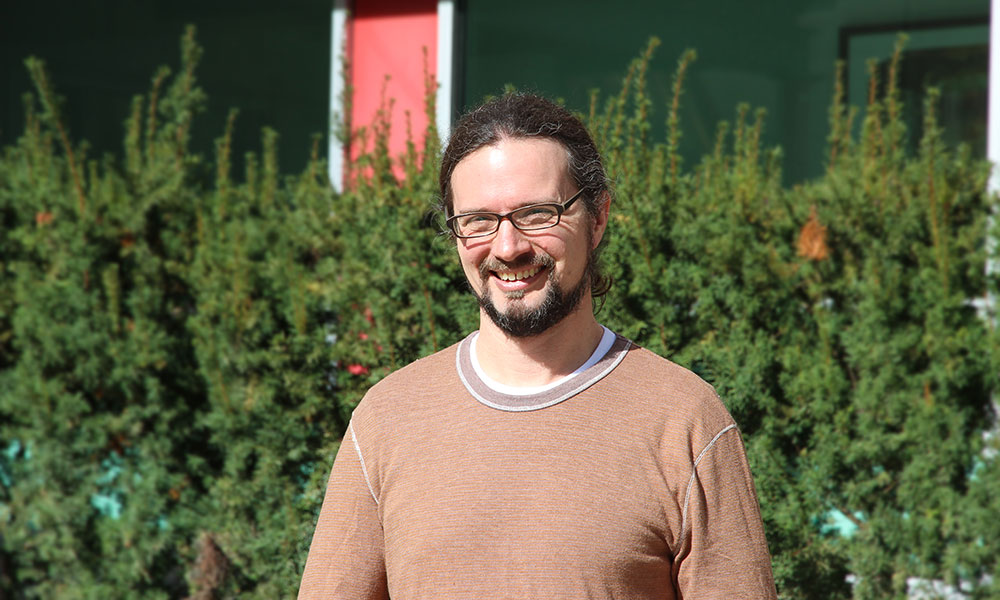Faculty Profile, People
Social engagement and global relationships
June 3, 2016

About
Name
David Jefferess
Role
Associate Professor
Programs
Cultural Studies and English
Faculty
Faculty of Creative and Critical Studies
Campus
Okanagan (Kelowna, BC)
Education
PhD in English, McMaster University (2003)
From
Hamilton, Ont.
“What is exciting to me is the idea of ‘unlearning’ a lot of the assumptions that I grew up with about Canadian identity and about my own racial privilege.”
LIVING AND WORKING in Malawi in the late-’90s led David Jefferess to pursue an academic career.
As a secondary school teacher in the small African country, he learned about the history of colonial violence in Africa as well as the long history of resistance against colonialism and globalization. “That experience inspired me to do activist work in Hamilton on issues related to international conflict, poverty and racism,” he says. “It led into academic work to understand these problems better and to be able to teach and publish about these issues.”
As an Associate Professor at UBC Okanagan, Jefferess is in the right place to teach Cultural Studies. A program distinct from others in western Canada, it is increasingly involved with community partners, while students learn about contemporary culture and develop practical skills in teamwork and socially engaged research.
“Cultural studies programs at other universities typically emphasize the study of pop culture, and while we do that in some courses, we have a significant emphasis on global relationships,” Jefferess says.
The program also seeks to make the form of teaching and learning consistent with the content. Students are expected to do a lot more than read books and write papers; classes are participatory, students often shape their own assignments, and courses are socially engaged.
Jefferess’ research focuses on the study of humanitarianism and international development, on planetary inter-connections and understanding the relationships that produce inequality. He is interested in looking at why the idea of “helping” has become the prominent way of addressing poverty, especially since the development model has not been successful, and global inequality is increasing.
The learning he began in Malawi is furthered by the learning he feels he has to do, living as a guest in Syilx (Okanagan) territory.
“What is exciting to me,” he says, “is the idea of ‘unlearning.’ To live in the Okanagan means having to understand Canada’s ongoing history of colonialism—it means unlearning a lot of the assumptions that I grew up with about Canadian identity, about my own racial privilege.
“The process of unlearning is challenging and it can be troubling, but it is also exciting to begin to see relationships, such as the relation between humans and the land, in a way very different from my upbringing and education.”
ALTER YOUR KNOWLEDGE
Jefferess joined the Faculty of Creative and Critical Studies in 2005 as an assistant professor of English. Over the next couple of years, Jefferess worked with other faculty members to create the Cultural Studies program, which draws together core Cultural Studies courses with a variety of Humanities and Social Sciences disciplines.
Over the past four years, he’s worked with his English program colleague, professor Allison Hargreaves, on organizing the AlterKnowledge Discussion Series—“a venue for so-called ‘alternative’ knowledge to be shared and valued, and for dominant systems of ‘knowledge’ to be altered.” The monthly forum for public dialogue is committed to creating spaces outside of the university to talk about issues of social justice and social inequality.
In 2015/16, they received an award from UBC’s Centennial Fund for the series, and thematically focused on UBC Okanagan’s identity and relationship to place, and specifically relations between indigenous and non-indigenous people. Among other conversations, topics covered what it means to be a “settler” today, residential schooling, artists responding to racism, and traditional ecology.
COMMUNITY CONNECTIONS
Students often come as undergrads to UBC Okanagan with aspirations of making a difference in the world. Jefferess’ teaching and research helps them to critically self-reflect on what it means to make a difference and how social injustices can be challenged.
The idea of global citizenship is popular in Canada. Jefferess has sought to foster alternatives to the “helping model,” providing students opportunities to reflect on and engage with community initiatives. These connections give students practical learning experiences.
“With the potential for tangible impacts—such as projects on fair trade and heritage commemorations—we give students opportunities to apply the theories that they learn about to their own lives and communities” he says.
“This kind of work and teaching is about building relationships and trying to understand them, and the importance of building trust—building relationships organically to create mutually beneficial relationships.”
Jefferess has worked with students to develop their own research projects by creating directed studies courses, which allow them to delve into specific areas of interest to create projects that have the potential for tangible impacts in the community.
LIVING IN THE OKANAGAN
One of the great things about life in the Okanagan Valley for Jefferess is the fact that he can bike to work most of the year, and it’s easy to get out of the city and onto the water or into the woods.
“The climate and geography here are wonderful. It allows for an active lifestyle, and a closeness to “nature.” But I am especially grateful for the opportunity I have to learn about this place and the long history and the strong presence of the Syilx people; to begin to understand more meaningfully the ecological, historical and social relations within which I am.”
—by Shauna Oddleifson
